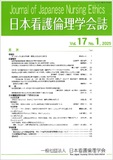Japanese
English
- 販売していません
- Abstract 文献概要
- 参考文献 Reference
目的:倫理的葛藤を内包する日常的看護実践場面における看護師の行為選択過程に関する国内の研究を概観し、その課題を明らかにする。方法:CiNii Research、医学中央雑誌Web版を用い、適格基準・除外基準に基づき対象文献を選定し、倫理的葛藤場面における看護師の行為選択とその思考過程に関する記述を抽出、要約、検討した。結果:21文献を選定、分析対象とした。考察:従来の研究成果では、倫理的葛藤場面における看護師の行為選択は、患者とその家族を中心におき、看護師の経験により得られた知識、価値観や信念、思考や感情および看護・医療チーム等組織環境による影響を受けて行われる円環的な思考過程であることが明らかとなっていた。再現性を担保し、妥当性を有する研究方法の開発が課題であった。
Purpose: This study aimed to provide an overview of research outcomes in Japan regarding the thinking processes that lead nurses to choose clinical conduct and to elucidate the associated issues, focusing on daily nursing practice scenarios involving ethical conflicts. Method: We selected relevant literature from CiNii Research and the “Igaku Chuo Zasshi (ICHUSHI)” web version, based on eligibility and exclusion criteria. We then extracted, summarized, and examined descriptions of nurses’ decision making processes in ethical conflict situations and the thinking processes leading to them. Results: A total of 21 studies were selected for analysis. Discussion: Previous research has shown that nurses’ choices regarding clinical conduct in daily practice situations involving ethical conflicts follow a circular thinking process centered on patients and their families. This process is influenced by nurses’ experiential knowledge, values, beliefs, thoughts, feelings, and the organizational environment, including the nursing and healthcare teams. The challenge lied in developing a research methodology that ensured reproducibility and validity.
Copyright © 2025, The Japan Nursing Ethics Associatin. All rights reserved.


